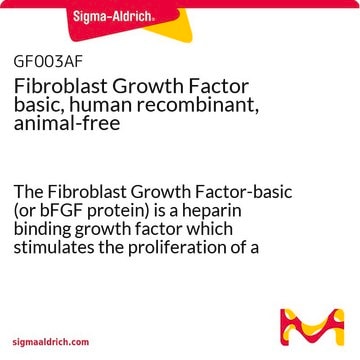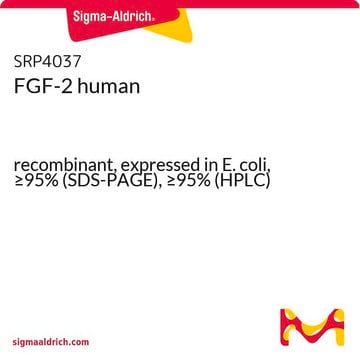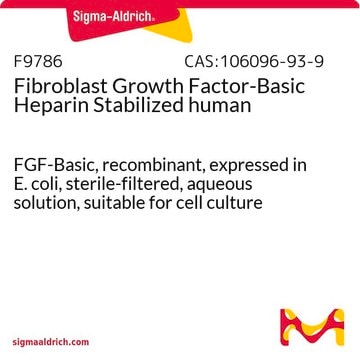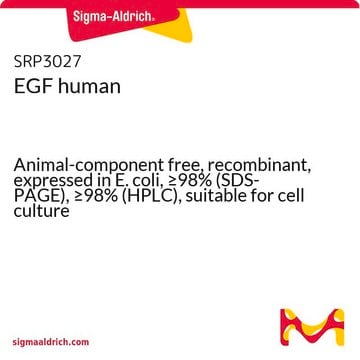F5392
Fibroblast Growth Factor-Basic from bovine pituitary
~90% (SDS-PAGE and N-terminal analysis), lyophilized powder, suitable for cell culture
Synonym(s):
FGF2, bFGF
Sign Into View Organizational & Contract Pricing
All Photos(1)
About This Item
Recommended Products
Product Name
Fibroblast Growth Factor-Basic from bovine pituitary, FGF-Basic, suitable for cell culture
biological source
bovine pituitary glands
Quality Level
Assay
~90% (SDS-PAGE and N-terminal analysis)
form
lyophilized powder
potency
0.03-3.0 ng/mL ED50/EC50
quality
endotoxin tested
mol wt
16.4 kDa
packaging
pkg of 1 μg
storage condition
avoid repeated freeze/thaw cycles
technique(s)
cell culture | mammalian: suitable
impurities
<0.5 EU/vial
color
white
UniProt accession no.
storage temp.
−20°C
Gene Information
bovine ... FGF2(281161)
General description
The fibroblast growth factor-2 (FGF2) gene is predominantly expressed in uterus, cornea and vascular endothelial cells. The FGF2 gene is mapped to cattle chromosome 17.
Application
A natural mitogenic growth factor used in cell culture applications to study cell signaling and to promote fibroblast and endothelial cell growth and survival.
Fibroblast Growth Factor-Basic from bovine pituitary has been used:
Fibroblast Growth Factor-Basic from bovine pituitary has been used:
- In animal and human cell culture
- In neuronal induction of adipose and bone marrow-derived rat mesenchymal stem cells
- In the generation of directly reprogramming fibroblast
- In human glioma cell culture
Biochem/physiol Actions
Fibroblast growth factor-2 (FGF2) stimulates cell proliferation, differentiation and migration. It is also known to participate in angiogenesis and carcinogenesis. During the estrous cycle, FGF2 expression is found to be maximum in porcine conceptuses and endometrium. Upregulation of this gene is also observed in pregnancy during peri-implantation. FGF2 is involved in embryogenesis, tissue repair and other metabolic pathways.
Physical form
Lyophilized from a 0.2 μm filtered solution in sodium phosphate and sodium chloride containing 0.1 mg bovine serum albumin
Preparation Note
Purified glands by a modification of the method of Gospodarowicz, et al.
Analysis Note
The proliferative activity is tested in culture using fetal bovine heart endothelial cells.
related product
Product No.
Description
Pricing
Storage Class Code
11 - Combustible Solids
WGK
WGK 3
Flash Point(F)
Not applicable
Flash Point(C)
Not applicable
Personal Protective Equipment
dust mask type N95 (US), Eyeshields, Gloves
Choose from one of the most recent versions:
Already Own This Product?
Find documentation for the products that you have recently purchased in the Document Library.
Customers Also Viewed
Single nucleotide polymorphism of FGF2 gene in Iranian Holstein proven bulls
Salehi A, et al.
Molecular Biology Research Communications, 4(1), 57-57 (2015)
Kathryn A Jacobs et al.
Methods in molecular biology (Clifton, N.J.), 1749, 51-58 (2018-03-12)
Endothelial cells have the capacity to shift between states of quiescence and angiogenesis. The early stage of angiogenesis, sprouting, occurs with the synchronized activities of tip cells, which lead the migration of the sprout, and stalk cells, which elongate this
Stimulatory effects of fibroblast growth factor 2 on proliferation and migration of uterine luminal epithelial cells during early pregnancy
Lim W, et al.
Biology of Reproduction, 96(1), 185-198 (2016)
Random/aligned electrospun PCL/PCL-collagen nanofibrous membranes: comparison of neural differentiation of rat AdMSCs and BMSCs
Capkin M, et al.
Biomedical Materials (Bristol, England), 7(4), 45013-45013 (2012)
Sensitivity of biochemical test in comparison with other methods for the detection of mycoplasma contamination in human and animal cell lines stored in the National Cell Bank of Iran
Kazemiha VM, et al.
Cytotechnology, 66(5), 861-873 (2014)
Our team of scientists has experience in all areas of research including Life Science, Material Science, Chemical Synthesis, Chromatography, Analytical and many others.
Contact Technical Service










